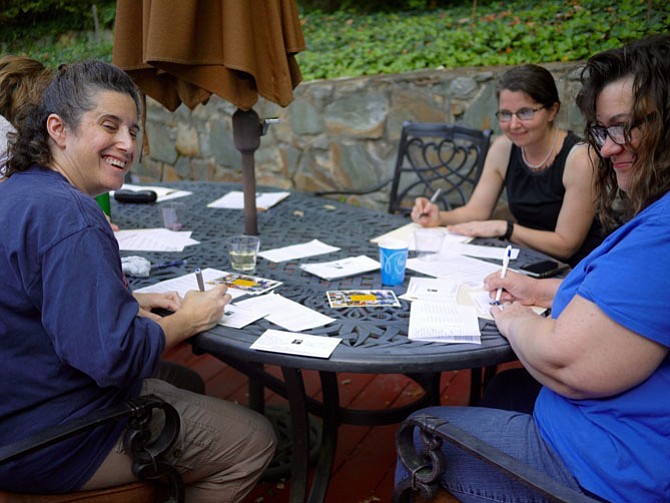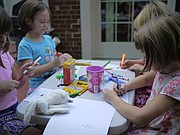(l-r) Rebecca Heaney, Susan Cunningham, and Dana Milburn sit at the table writing postcards on Liz Lord’s patio. Photo by Eden Brown.
Tron has been in the U.S. for 10 years. She has never voted. She looks down at her hands: she is not sure why she isn’t registered; she didn’t see much point in voting before. Her colleague, Thi, also working long days in a nail salon in Arlington, declared she will vote this year, for the first time in the 20 years she has been in the United States. Why now? “This vote is important.” Some of the issues in this campaign have pushed her buttons. She doesn’t like the way some of the candidates have talked about women. She sympathizes with her unregistered colleague, though. “It hard,” she said. “We work all day. It not easy to find time to register. In our old country, you don’t have to register before the vote: you just walk in.” The women commute from Springfield to their place of work in Arlington. They rise early, take care of their families, work from 9 a.m.-8 p.m. Who has time to worry about a vote?
Tron ended up trying to register to vote, but the computer program she used didn’t work when she put in all her data, twice. It said she would have to print the registration form and mail it. She took her phone home to try to find a printer so she could at least mail the application in. But no one she knew had a printer. A client printed out the application to register and mailed it for her since she didn’t have a printer. But when she called the Fairfax Voting Registration office on Oct. 31, they had not received her written application and she was not going to be able to vote.
A group of Arlington women is trying to increase the number of voters in Arlington by writing postcards to them urging them to vote. Jill Caiazzo and Marjorie Signer organized “postcard parties” on Oct. 29 and 30 to send 1,400 postcards to Arlingtonians who don’t regularly vote. The idea of a postcard campaign began during the 2013 gubernatorial voting when the National Organization for Women (NOW) sent out 25,000 postcards to women in several cities in Virginia, Arlington among them, to urge them to vote. Ten thousand of those were handwritten by Virginia women who wanted to see more women take responsibility for issues that affect them, 15,000 were written by a mail house. Data analysis, although difficult to quantify, after that campaign seemed to indicate that the women voters in Arlington, at least, had responded to the cards.
Signer said the Democrats have a data management expert in Arlington who analyzed voter turnout records: the analyst was able to identify people who were not voting on a regular basis. These women, over a thousand of them, are between the ages of 40-65, and are likely Democrats who do not vote consistently and do not live in households with other consistent Democratic voters. Many of them live in apartment buildings where door-to-door canvassing is not possible. Many are relatively new citizens.
“Even if it’s only one or two women who come out and vote as a result,” Signer said, “It’s worth it.” Signer called her fellow postcard writer Caiazzo a “Jill of all trades” who works for an I.T. company and designed the postcards for the current campaign. Caiazzo said she joined Arlington Democrats when she found out Hillary Clinton was going to run for president again, because she had made a promise to herself in 2008 that if Clinton ever did run again, Caiazzo would be right there supporting her. Caiazzo and Signer felt it was important to mobilize women for the current campaign. “It’s not that we thought Hillary Clinton would lose the election if these women who don’t regularly vote stayed home: it’s that we wanted to mobilize women who were not engaged because the outcome of the election affects women so much.”
Joan McDermott donated her house for the postcard writing party in North Arlington on Saturday, and Carrie Johnson donated an additional 500 postcards when so many postcard writers showed up to write messages about voting that they had to run out and get more printed.
One party was at the house of Liz Lord, in North Arlington, and she made it special by inviting children with their mothers, as well as making sure the children had Halloween treats at the end. The youngsters decorated the postcards once the mothers wrote them. They talked about some of the things they had heard about while being active politically this season: there had been a conversations with the American Muslim Women Political Action Committee who are embracing grassroots activism in America; they learned some Afghani-American women had trouble being political activists because it was not the tradition in their country to allow women to be involved in politics.
Lord joined Moms 4HRC, a Bethesda grass roots organization founded by a Bethesda mother in June to disseminate positive information about Clinton and women candidates in general and to raise funds for the candidate. The Arlington women who got involved learned a lot about grassroots campaigns: how the ground game works, how the Virginia campaign to get out the vote was still important even though a lot of effort was being focused on Pennsylvania.
They also learned that according to Emily’s List President Stephanie Schriock, the single greatest game changer for a woman who is deciding how to vote is a conversation with another woman. Emily’s List is an organization which seeks gender parity in representation in the legislature and in elected positions across the country. Lord smiled at the children as they took part in the process: “Nine moms and 11 kids wrote and decorated 120 postcards to asking women in Arlington to vote … these kids are never going to forget this.”

